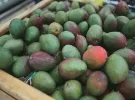After a difficult season last year, mango growers in India are looking at higher exports this year. Malaysia and Argentina have emerged as the new markets for the Indian mango this season with exports to the Middle East expected to commence next month onwards, senior officials of the Maharashtra State Agriculture Marketing Board (MSAMB) said.
 Australia, the USA, Europe, UK New Zealand, Japan and South Korea are other potential markets for the Indian mango. India normally exports around 50,000 tonnes of the Alphonso and Kesar varieties of mangoes every year. Maharashtra is the largest mango exporter in the country and accounts for nearly 80% of the total export of the country.
Australia, the USA, Europe, UK New Zealand, Japan and South Korea are other potential markets for the Indian mango. India normally exports around 50,000 tonnes of the Alphonso and Kesar varieties of mangoes every year. Maharashtra is the largest mango exporter in the country and accounts for nearly 80% of the total export of the country.
At least 13,603 mango orchards have registered on MangoNet — an online traceability system in the current season. This includes 5000 Kesar growers and 9000 mango growers. MangoNet has been established by APEDA to register mango growers and exporters and enable importers and supermarkets in the EU to check complete details of their shipments — on the lines of ‘GrapeNet’ established for grapes. Last year only 8,700 orchards were registered on MangoNet.
Officials from MSAMB, the state marketing board in Maharashtra, said they have been working at a frantic pace to ready all facilities for export. MSAMB has prepared its vapour heat treatment plant at Vashi, Navi Mumbai, irradiation facility at Baramati and export facilitation centre at Ratnagiri, pre-cooling storage facilities, ripening chambers and packhouse for export.
Of the total mango exports from the country, Kesar accounts for 50-55%, Bangnapalli accounts for some 30%, Hapus or Alphonso another 13-15% and the remaining 40 other varieties account for the last 9-10% of the total outbound shipment.
The mango season is expected to begin a month late with low arrivals in March due to the delay in winter. The government has granted Geographical Indication (GI) tag to the Alphonso mango from Ratnagiri, Sindhudurg and other adjoining areas, a move that will help identify the authenticity of this variety of fruit. This is expected to help with higher exports.
Source: Financial Express
